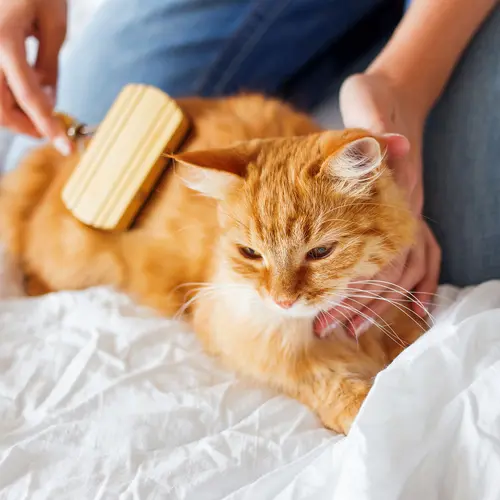If you’re welcoming a new baby, you may feel nervous about the prospect of introducing your beloved kitty to the newest member of the family. Fortunately, cats and babies can live together happily, but it will take some familial preparation to make sure everything goes smoothly.
Much like setting up your home for your new baby’s arrival, it is important to prepare your cat for the upcoming changes as early as possible. Proactive preparation will save you and your cat from stress and unwanted behavioral issues so that the whole family can live in harmony.
How to Prepare Before Baby Arrives
While it may seem overwhelming, there are several items you can add to your baby to-do list that will help your cat transition from being an only child to sharing their home with a new little one. These may include:
Take health precautions. As a cat owner, you may have heard of toxoplasmosis. Toxoplasmosis is a parasite that can spread from cats to humans or from consuming undercooked meats or raw goat milk. It can also spread from mother to unborn baby. This parasite causes many health conditions in an unborn baby, such as blindness, deafness, or hydrocephalus.
To prevent the spread of this parasite from cat to human, avoid stray cats and keep your cat indoors. Be sure to wear gloves when handling litter boxes or outdoor gardens. For pregnant cat owners, it’s best to avoid scooping litter when possible and to undergo regular screening.
Make gradual changes. As you prepare your home for your new baby, it’s important to spend plenty of time with your cat, preparing them for life with a baby. Take these steps to help your cat adjust smoothly:
- Prepare your cat to be handled by a baby. Some cats love to be petted, while others simply don’t. Get your cat used to being touched more often and become more attuned to their likes and dislikes. Be ready to intervene when your baby becomes more mobile to avoid the little one disturbing — or grabbing — your cat.
- Avoid playing hand games. If your cat is used to playing games with your hands, stop this as soon as possible. Even a gentle cat can upset or injure a baby by mistake. Teach your cat that only toys are appropriate for play.
- Get your cat used to baby sounds. In the months leading up to your baby’s birth, prepare your cat for these new sounds by playing recordings of babies gurgling, cooing, and — yes — even screaming throughout the day. Start quietly and increase the volume as your cat gets used to the new sounds. To avoid putting stress on your cat, move through the process gradually.
- Introduce baby smells and objects into your home. Cats rely heavily on smell, so a baby and new baby objects can offend their senses. Bring powders, shampoos, and formula into your home to help your cat adjust before the baby arrives. Placing baby products on your own skin can help your cat develop positive associations with the new smells.
How to Introduce Baby and Kitty
When you arrive home from the hospital with your new baby, there may be a lot going on — visitors, gifts, new routines — but it’s important that you take the time to introduce baby and kitty. Once the baby arrives, make sure to:
Set aside quiet time — just you, kitty, and baby — to peacefully greet one another. Give your cat quiet time to reconnect with you and meet the baby without interruption.
Give your cat an item to investigate. Use a baby blanket or piece of clothing in a quiet, safe place where kitty can explore on their own time. This will help your cat get used to the baby at their own pace.
Supervise kitty-and-baby time. Cats love to snuggle, but this can pose a risk when your newborn can't yet move their head. Always keep the door closed when you can't immediately supervise your child and cat together.
Things to Watch Out For
As you, your baby, and your cat get used to your new life together, be on the lookout for signs of stress. Important things to consider are:
Hygiene. With a newborn in the house, it's more important than ever to keep your cat clean and free of pests. Stay on top of preventative prescriptions and maintain regular screenings with your vet. Be aware that dirty diapers can encourage your cat to create their own mess. Always place soiled diapers or clothing in its proper receptacle immediately.
Safety. Even as your cat and baby get used to one another, you shouldn't leave them alone together. To prevent any accidents, use a screen door to let your cat see and hear the baby without investigating unattended. Toddlers can be especially stressful for cats, so maintain supervision as your baby grows. Continue to provide a quiet, safe place where kitty can be away from the baby if needed.
Patience. It can take time for your cat and baby to become friends. Be patient with both kitty and baby and remain open to the idea that your cat may prefer to steer clear of the baby. Taking the time to make sure that cat and baby are both safe and happy will result in a harmonious home!


